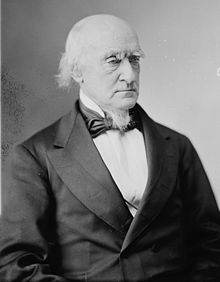John Archibald Campbell
| John Archibald Campbell | |
|---|---|
 |
|
| Associate Justice of the Supreme Court of the United States | |
|
In office March 23, 1853 – April 30, 1861 |
|
| Nominated by | Franklin Pierce |
| Preceded by | John McKinley |
| Succeeded by | David Davis |
| Personal details | |
| Born |
June 24, 1811 Washington, Georgia, U.S. |
| Died | March 12, 1889 (aged 77) Baltimore, Maryland, U.S. |
| Political party | Democratic |
| Education |
University of Georgia (BA) United States Military Academy |
John Archibald Campbell (June 24, 1811 – March 12, 1889) was an American jurist. He was a successful lawyer in Georgia and Alabama, where he served in the State legislatures. Appointed by Franklin Pierce to the United States Supreme Court in 1853, he served until the outbreak of the American Civil War, when he became an official of the Confederate States of America. After serving six months in a military prison, he resumed a successful law practice in New Orleans, where he opposed Reconstruction.
Campbell was born near Washington, Georgia, to Col. Duncan Greene Campbell (for whom the now-defunct Campbell County, Georgia was named). Considered a child prodigy, he graduated from the University of Georgia in 1825 at the age of 14, and immediately enrolled at the United States Military Academy for three years and would have graduated in 1830, but withdrew upon the death of his father (July 1828) and returned home to Georgia. He read law with former Georgia governor John Clark, and was admitted to the bar in 1829, at the age of 18 which required a special act of the Georgia legislature.
While at the United States Military Academy in West Point, New York, on 24–25 December 1826, Campbell was involved in the Eggnog Riot also known as the "Grog Mutiny". Proceedings began on December 26, 1826, courts-martial was complete on 16 March 1827, and ended on May 3, 1827, with the President adjusting some of the verdicts and approving of the rest. Campbell was among 70 cadets that were involved but a review concluded that only 20 (one soldier) be charged. Many notable cadets such as Jefferson Davis (involved but not charged), and Robert E. Lee (not involved but testified), were involved in the incident. Nine expulsions were approved by President John Quincy Adams. There was a call for Campbell to be expelled, along with James W. M. "Weems" Berrien (remittance allowed) but this was rejected so Campbell escaped court martial.
...
Wikipedia
